Evaluating Leadership Styles, Ethics, and Culture at Tesco Plc
VerifiedAdded on 2023/01/05
|14
|3990
|57
Report
AI Summary
This report provides an analysis of various leadership styles and their application within Tesco Plc, a global grocery and merchandise retailer. It examines how different leadership styles are suited to specific situations, such as organizational policy changes, expansion decisions, client interactions, and international growth. The report also critically assesses the prevailing leadership styles within Tesco, focusing on the establishment of a culture of professionalism, mutual respect, trust, and support among teams. Furthermore, it evaluates Tesco's ethical and value-based approach to leadership, highlighting the company's efforts to maintain a positive image and employee confidence following significant challenges like accounting scandals. The analysis covers transformational, democratic, autocratic, laissez-faire, bureaucratic, servant, transactional, situational, cross-cultural, and charismatic leadership styles, providing a comprehensive overview of leadership dynamics within the organization.
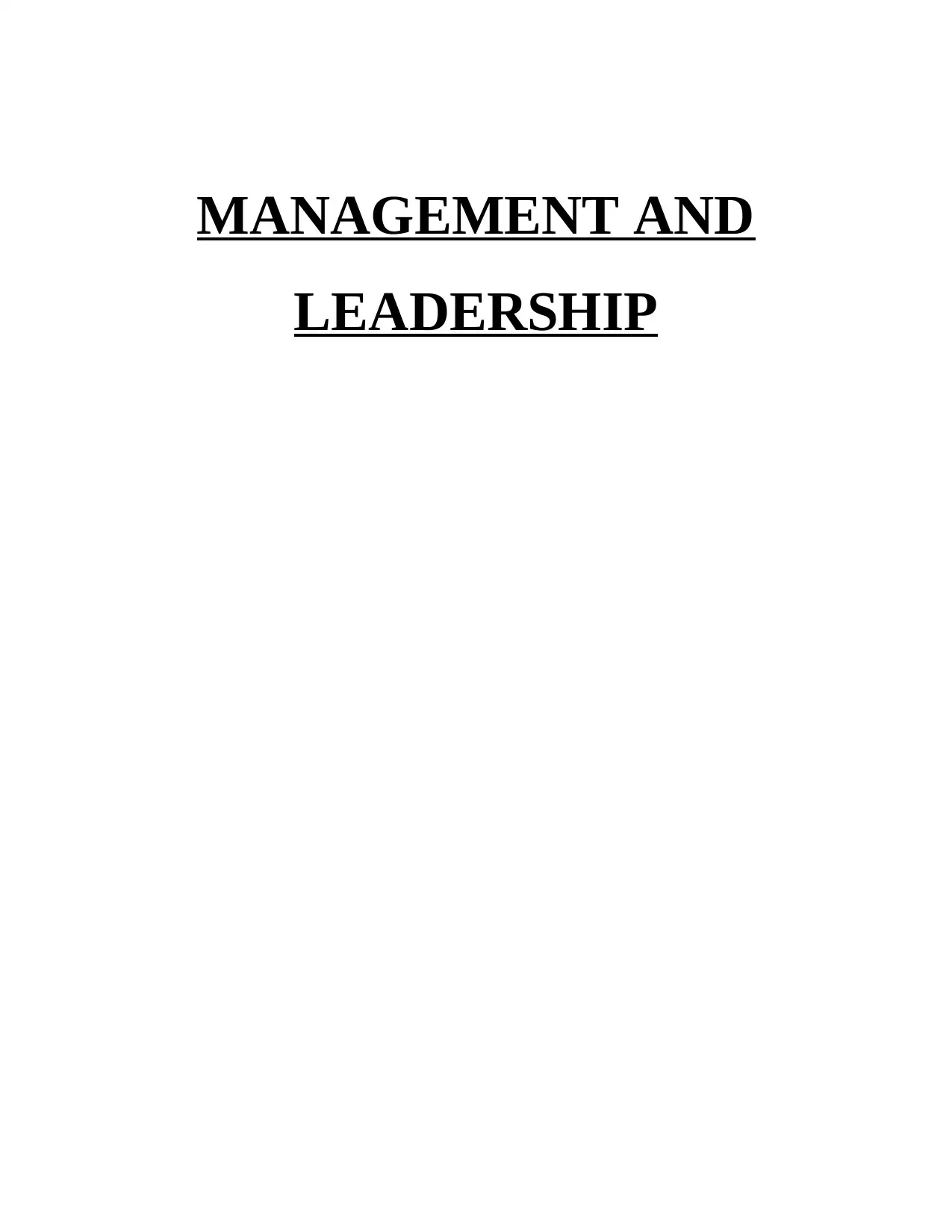
MANAGEMENT AND
LEADERSHIP
LEADERSHIP
Paraphrase This Document
Need a fresh take? Get an instant paraphrase of this document with our AI Paraphraser
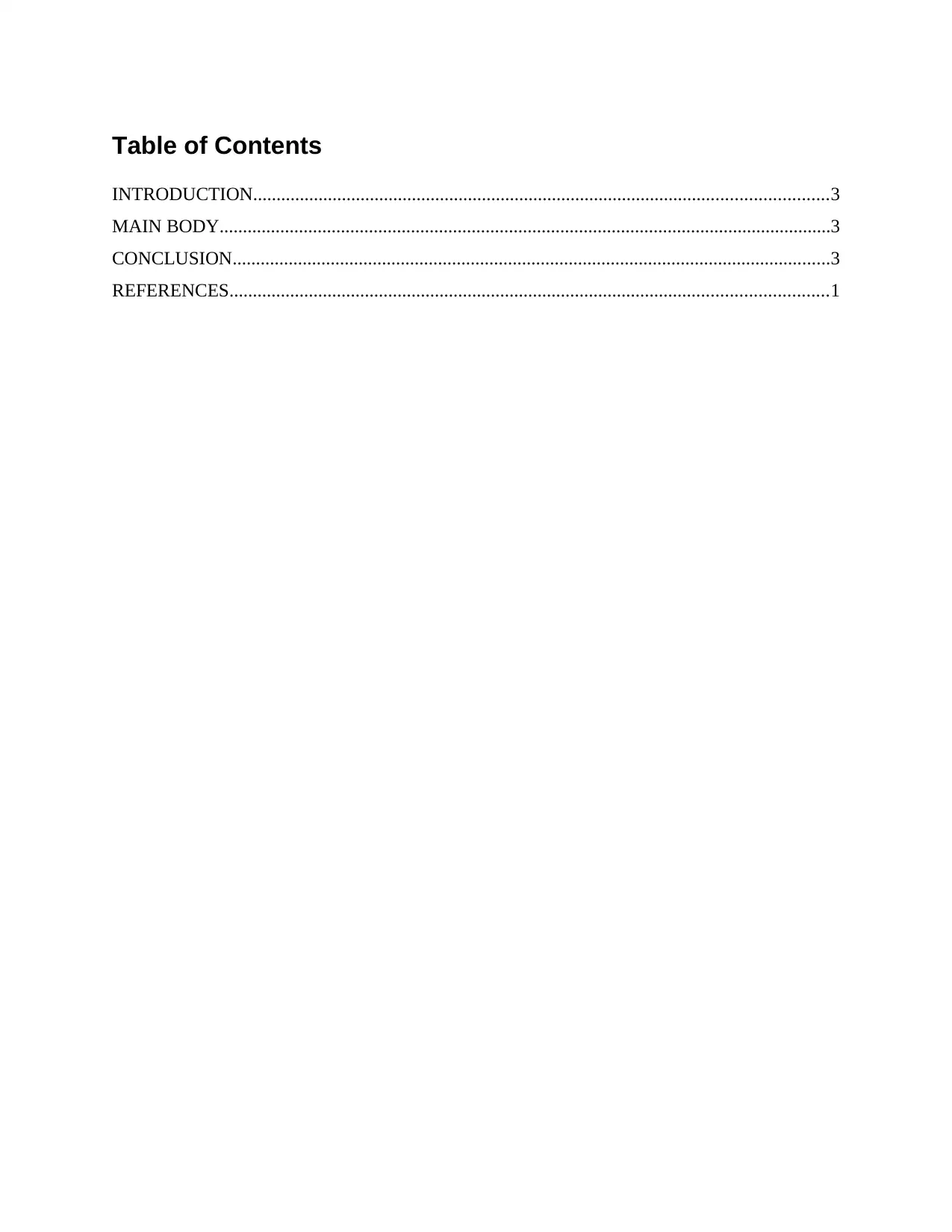
Table of Contents
INTRODUCTION...........................................................................................................................3
MAIN BODY...................................................................................................................................3
CONCLUSION................................................................................................................................3
REFERENCES................................................................................................................................1
INTRODUCTION...........................................................................................................................3
MAIN BODY...................................................................................................................................3
CONCLUSION................................................................................................................................3
REFERENCES................................................................................................................................1
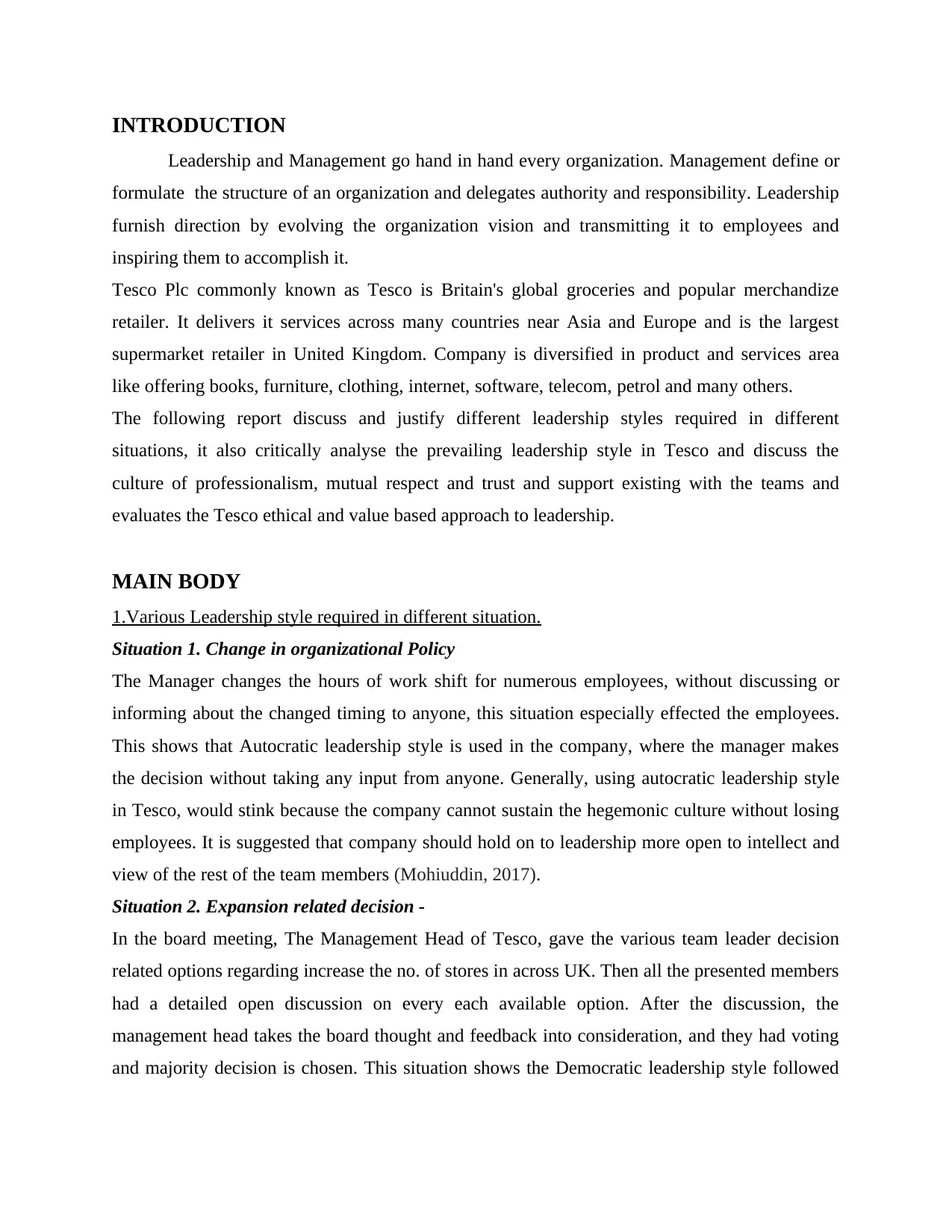
INTRODUCTION
Leadership and Management go hand in hand every organization. Management define or
formulate the structure of an organization and delegates authority and responsibility. Leadership
furnish direction by evolving the organization vision and transmitting it to employees and
inspiring them to accomplish it.
Tesco Plc commonly known as Tesco is Britain's global groceries and popular merchandize
retailer. It delivers it services across many countries near Asia and Europe and is the largest
supermarket retailer in United Kingdom. Company is diversified in product and services area
like offering books, furniture, clothing, internet, software, telecom, petrol and many others.
The following report discuss and justify different leadership styles required in different
situations, it also critically analyse the prevailing leadership style in Tesco and discuss the
culture of professionalism, mutual respect and trust and support existing with the teams and
evaluates the Tesco ethical and value based approach to leadership.
MAIN BODY
1.Various Leadership style required in different situation.
Situation 1. Change in organizational Policy
The Manager changes the hours of work shift for numerous employees, without discussing or
informing about the changed timing to anyone, this situation especially effected the employees.
This shows that Autocratic leadership style is used in the company, where the manager makes
the decision without taking any input from anyone. Generally, using autocratic leadership style
in Tesco, would stink because the company cannot sustain the hegemonic culture without losing
employees. It is suggested that company should hold on to leadership more open to intellect and
view of the rest of the team members (Mohiuddin, 2017).
Situation 2. Expansion related decision -
In the board meeting, The Management Head of Tesco, gave the various team leader decision
related options regarding increase the no. of stores in across UK. Then all the presented members
had a detailed open discussion on every each available option. After the discussion, the
management head takes the board thought and feedback into consideration, and they had voting
and majority decision is chosen. This situation shows the Democratic leadership style followed
Leadership and Management go hand in hand every organization. Management define or
formulate the structure of an organization and delegates authority and responsibility. Leadership
furnish direction by evolving the organization vision and transmitting it to employees and
inspiring them to accomplish it.
Tesco Plc commonly known as Tesco is Britain's global groceries and popular merchandize
retailer. It delivers it services across many countries near Asia and Europe and is the largest
supermarket retailer in United Kingdom. Company is diversified in product and services area
like offering books, furniture, clothing, internet, software, telecom, petrol and many others.
The following report discuss and justify different leadership styles required in different
situations, it also critically analyse the prevailing leadership style in Tesco and discuss the
culture of professionalism, mutual respect and trust and support existing with the teams and
evaluates the Tesco ethical and value based approach to leadership.
MAIN BODY
1.Various Leadership style required in different situation.
Situation 1. Change in organizational Policy
The Manager changes the hours of work shift for numerous employees, without discussing or
informing about the changed timing to anyone, this situation especially effected the employees.
This shows that Autocratic leadership style is used in the company, where the manager makes
the decision without taking any input from anyone. Generally, using autocratic leadership style
in Tesco, would stink because the company cannot sustain the hegemonic culture without losing
employees. It is suggested that company should hold on to leadership more open to intellect and
view of the rest of the team members (Mohiuddin, 2017).
Situation 2. Expansion related decision -
In the board meeting, The Management Head of Tesco, gave the various team leader decision
related options regarding increase the no. of stores in across UK. Then all the presented members
had a detailed open discussion on every each available option. After the discussion, the
management head takes the board thought and feedback into consideration, and they had voting
and majority decision is chosen. This situation shows the Democratic leadership style followed
⊘ This is a preview!⊘
Do you want full access?
Subscribe today to unlock all pages.

Trusted by 1+ million students worldwide
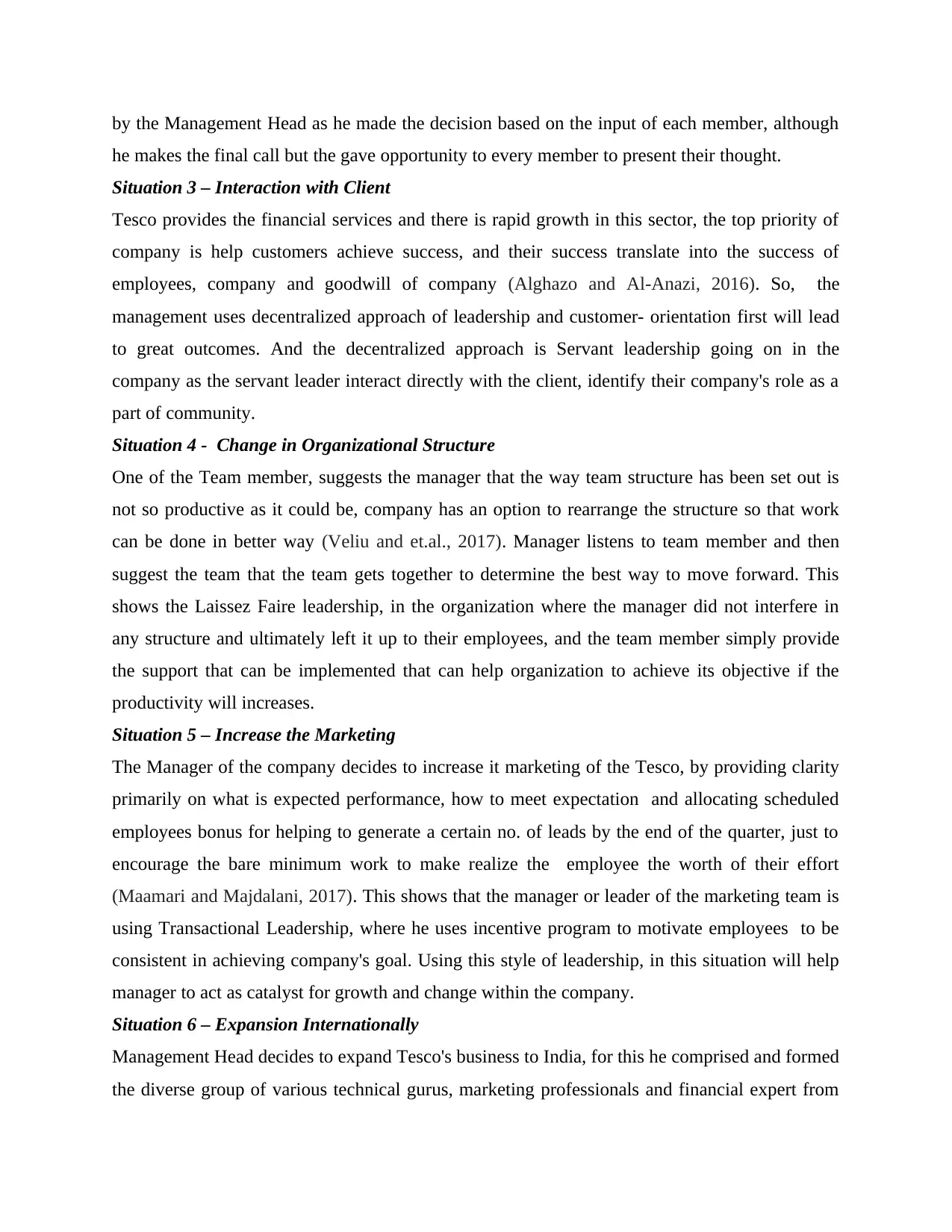
by the Management Head as he made the decision based on the input of each member, although
he makes the final call but the gave opportunity to every member to present their thought.
Situation 3 – Interaction with Client
Tesco provides the financial services and there is rapid growth in this sector, the top priority of
company is help customers achieve success, and their success translate into the success of
employees, company and goodwill of company (Alghazo and Al-Anazi, 2016). So, the
management uses decentralized approach of leadership and customer- orientation first will lead
to great outcomes. And the decentralized approach is Servant leadership going on in the
company as the servant leader interact directly with the client, identify their company's role as a
part of community.
Situation 4 - Change in Organizational Structure
One of the Team member, suggests the manager that the way team structure has been set out is
not so productive as it could be, company has an option to rearrange the structure so that work
can be done in better way (Veliu and et.al., 2017). Manager listens to team member and then
suggest the team that the team gets together to determine the best way to move forward. This
shows the Laissez Faire leadership, in the organization where the manager did not interfere in
any structure and ultimately left it up to their employees, and the team member simply provide
the support that can be implemented that can help organization to achieve its objective if the
productivity will increases.
Situation 5 – Increase the Marketing
The Manager of the company decides to increase it marketing of the Tesco, by providing clarity
primarily on what is expected performance, how to meet expectation and allocating scheduled
employees bonus for helping to generate a certain no. of leads by the end of the quarter, just to
encourage the bare minimum work to make realize the employee the worth of their effort
(Maamari and Majdalani, 2017). This shows that the manager or leader of the marketing team is
using Transactional Leadership, where he uses incentive program to motivate employees to be
consistent in achieving company's goal. Using this style of leadership, in this situation will help
manager to act as catalyst for growth and change within the company.
Situation 6 – Expansion Internationally
Management Head decides to expand Tesco's business to India, for this he comprised and formed
the diverse group of various technical gurus, marketing professionals and financial expert from
he makes the final call but the gave opportunity to every member to present their thought.
Situation 3 – Interaction with Client
Tesco provides the financial services and there is rapid growth in this sector, the top priority of
company is help customers achieve success, and their success translate into the success of
employees, company and goodwill of company (Alghazo and Al-Anazi, 2016). So, the
management uses decentralized approach of leadership and customer- orientation first will lead
to great outcomes. And the decentralized approach is Servant leadership going on in the
company as the servant leader interact directly with the client, identify their company's role as a
part of community.
Situation 4 - Change in Organizational Structure
One of the Team member, suggests the manager that the way team structure has been set out is
not so productive as it could be, company has an option to rearrange the structure so that work
can be done in better way (Veliu and et.al., 2017). Manager listens to team member and then
suggest the team that the team gets together to determine the best way to move forward. This
shows the Laissez Faire leadership, in the organization where the manager did not interfere in
any structure and ultimately left it up to their employees, and the team member simply provide
the support that can be implemented that can help organization to achieve its objective if the
productivity will increases.
Situation 5 – Increase the Marketing
The Manager of the company decides to increase it marketing of the Tesco, by providing clarity
primarily on what is expected performance, how to meet expectation and allocating scheduled
employees bonus for helping to generate a certain no. of leads by the end of the quarter, just to
encourage the bare minimum work to make realize the employee the worth of their effort
(Maamari and Majdalani, 2017). This shows that the manager or leader of the marketing team is
using Transactional Leadership, where he uses incentive program to motivate employees to be
consistent in achieving company's goal. Using this style of leadership, in this situation will help
manager to act as catalyst for growth and change within the company.
Situation 6 – Expansion Internationally
Management Head decides to expand Tesco's business to India, for this he comprised and formed
the diverse group of various technical gurus, marketing professionals and financial expert from
Paraphrase This Document
Need a fresh take? Get an instant paraphrase of this document with our AI Paraphraser
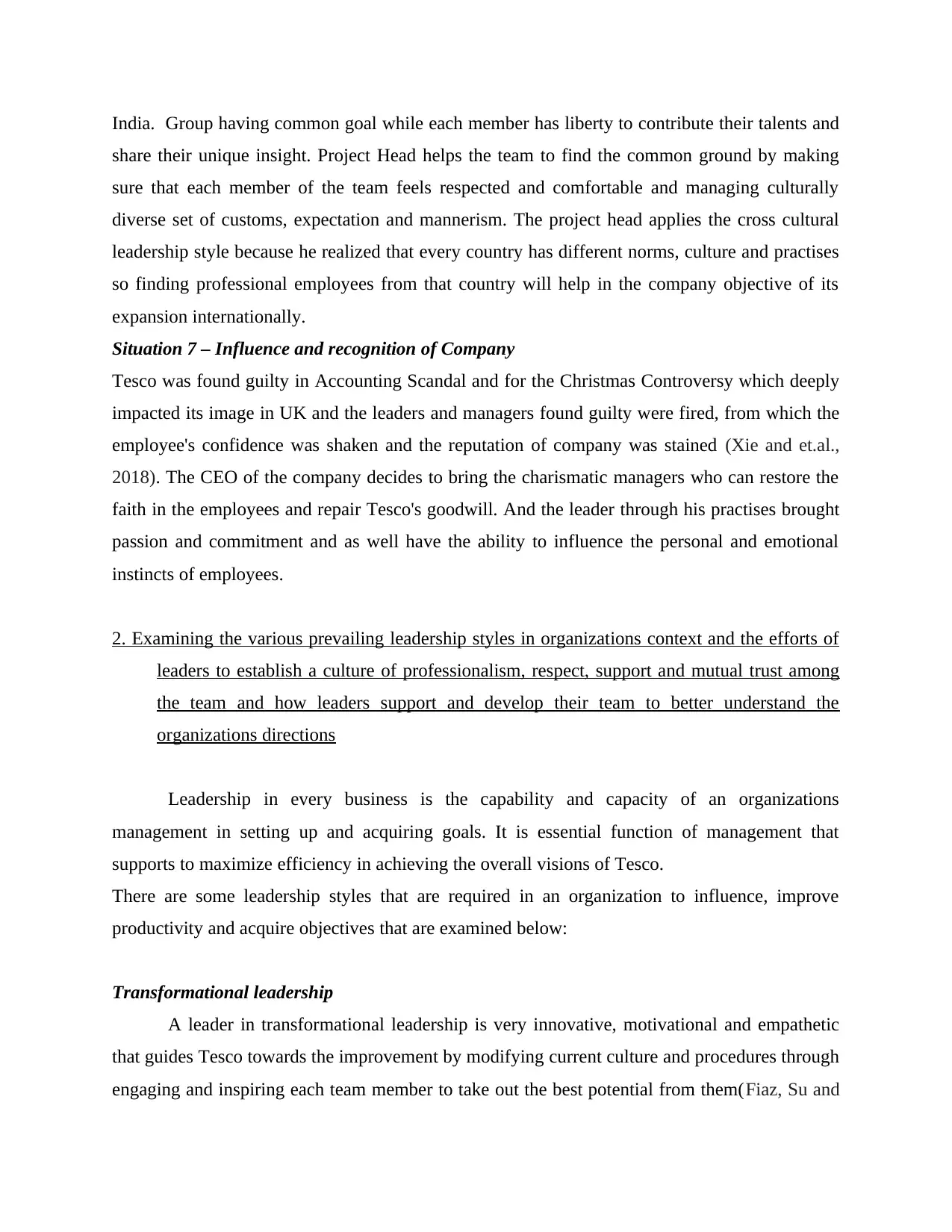
India. Group having common goal while each member has liberty to contribute their talents and
share their unique insight. Project Head helps the team to find the common ground by making
sure that each member of the team feels respected and comfortable and managing culturally
diverse set of customs, expectation and mannerism. The project head applies the cross cultural
leadership style because he realized that every country has different norms, culture and practises
so finding professional employees from that country will help in the company objective of its
expansion internationally.
Situation 7 – Influence and recognition of Company
Tesco was found guilty in Accounting Scandal and for the Christmas Controversy which deeply
impacted its image in UK and the leaders and managers found guilty were fired, from which the
employee's confidence was shaken and the reputation of company was stained (Xie and et.al.,
2018). The CEO of the company decides to bring the charismatic managers who can restore the
faith in the employees and repair Tesco's goodwill. And the leader through his practises brought
passion and commitment and as well have the ability to influence the personal and emotional
instincts of employees.
2. Examining the various prevailing leadership styles in organizations context and the efforts of
leaders to establish a culture of professionalism, respect, support and mutual trust among
the team and how leaders support and develop their team to better understand the
organizations directions
Leadership in every business is the capability and capacity of an organizations
management in setting up and acquiring goals. It is essential function of management that
supports to maximize efficiency in achieving the overall visions of Tesco.
There are some leadership styles that are required in an organization to influence, improve
productivity and acquire objectives that are examined below:
Transformational leadership
A leader in transformational leadership is very innovative, motivational and empathetic
that guides Tesco towards the improvement by modifying current culture and procedures through
engaging and inspiring each team member to take out the best potential from them(Fiaz, Su and
share their unique insight. Project Head helps the team to find the common ground by making
sure that each member of the team feels respected and comfortable and managing culturally
diverse set of customs, expectation and mannerism. The project head applies the cross cultural
leadership style because he realized that every country has different norms, culture and practises
so finding professional employees from that country will help in the company objective of its
expansion internationally.
Situation 7 – Influence and recognition of Company
Tesco was found guilty in Accounting Scandal and for the Christmas Controversy which deeply
impacted its image in UK and the leaders and managers found guilty were fired, from which the
employee's confidence was shaken and the reputation of company was stained (Xie and et.al.,
2018). The CEO of the company decides to bring the charismatic managers who can restore the
faith in the employees and repair Tesco's goodwill. And the leader through his practises brought
passion and commitment and as well have the ability to influence the personal and emotional
instincts of employees.
2. Examining the various prevailing leadership styles in organizations context and the efforts of
leaders to establish a culture of professionalism, respect, support and mutual trust among
the team and how leaders support and develop their team to better understand the
organizations directions
Leadership in every business is the capability and capacity of an organizations
management in setting up and acquiring goals. It is essential function of management that
supports to maximize efficiency in achieving the overall visions of Tesco.
There are some leadership styles that are required in an organization to influence, improve
productivity and acquire objectives that are examined below:
Transformational leadership
A leader in transformational leadership is very innovative, motivational and empathetic
that guides Tesco towards the improvement by modifying current culture and procedures through
engaging and inspiring each team member to take out the best potential from them(Fiaz, Su and
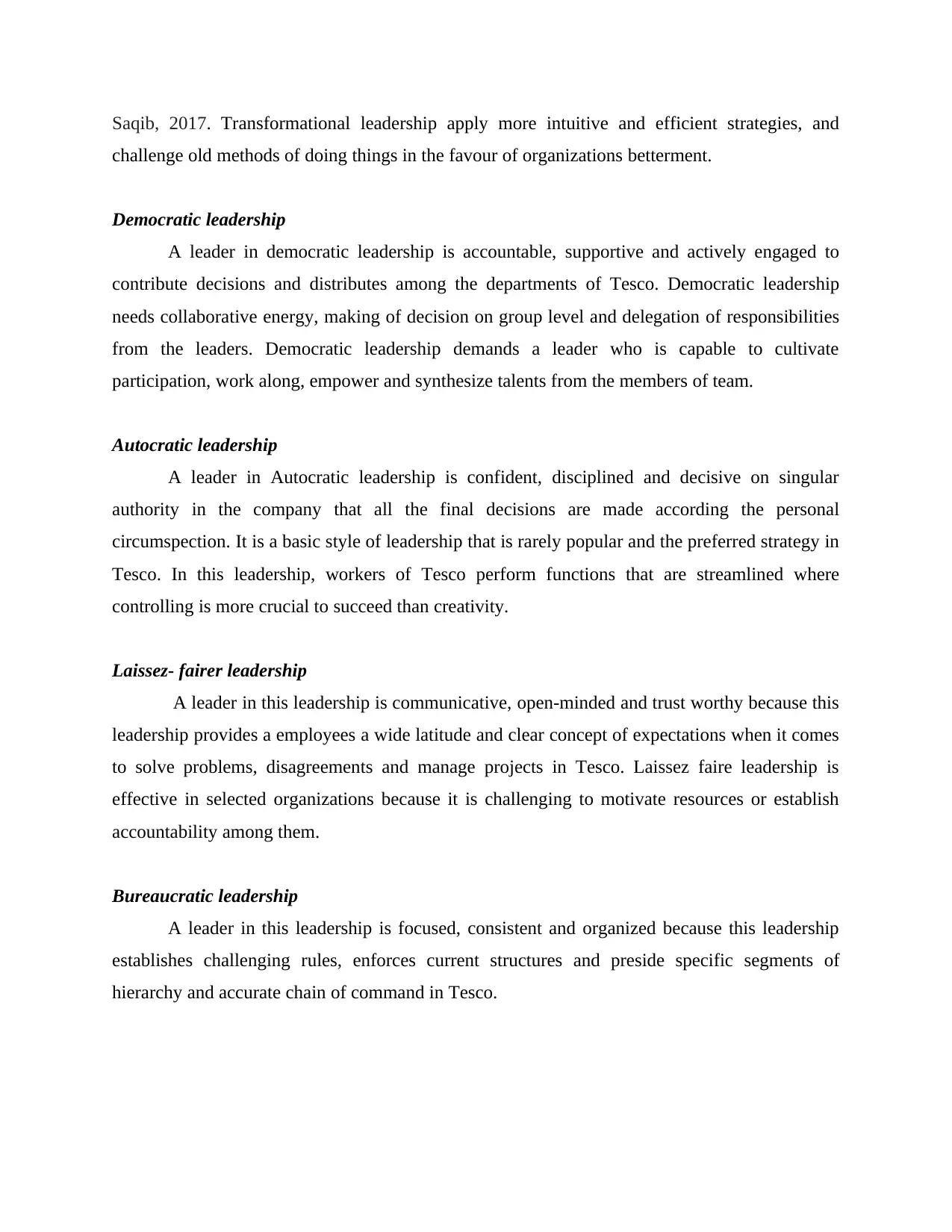
Saqib, 2017. Transformational leadership apply more intuitive and efficient strategies, and
challenge old methods of doing things in the favour of organizations betterment.
Democratic leadership
A leader in democratic leadership is accountable, supportive and actively engaged to
contribute decisions and distributes among the departments of Tesco. Democratic leadership
needs collaborative energy, making of decision on group level and delegation of responsibilities
from the leaders. Democratic leadership demands a leader who is capable to cultivate
participation, work along, empower and synthesize talents from the members of team.
Autocratic leadership
A leader in Autocratic leadership is confident, disciplined and decisive on singular
authority in the company that all the final decisions are made according the personal
circumspection. It is a basic style of leadership that is rarely popular and the preferred strategy in
Tesco. In this leadership, workers of Tesco perform functions that are streamlined where
controlling is more crucial to succeed than creativity.
Laissez- fairer leadership
A leader in this leadership is communicative, open-minded and trust worthy because this
leadership provides a employees a wide latitude and clear concept of expectations when it comes
to solve problems, disagreements and manage projects in Tesco. Laissez faire leadership is
effective in selected organizations because it is challenging to motivate resources or establish
accountability among them.
Bureaucratic leadership
A leader in this leadership is focused, consistent and organized because this leadership
establishes challenging rules, enforces current structures and preside specific segments of
hierarchy and accurate chain of command in Tesco.
challenge old methods of doing things in the favour of organizations betterment.
Democratic leadership
A leader in democratic leadership is accountable, supportive and actively engaged to
contribute decisions and distributes among the departments of Tesco. Democratic leadership
needs collaborative energy, making of decision on group level and delegation of responsibilities
from the leaders. Democratic leadership demands a leader who is capable to cultivate
participation, work along, empower and synthesize talents from the members of team.
Autocratic leadership
A leader in Autocratic leadership is confident, disciplined and decisive on singular
authority in the company that all the final decisions are made according the personal
circumspection. It is a basic style of leadership that is rarely popular and the preferred strategy in
Tesco. In this leadership, workers of Tesco perform functions that are streamlined where
controlling is more crucial to succeed than creativity.
Laissez- fairer leadership
A leader in this leadership is communicative, open-minded and trust worthy because this
leadership provides a employees a wide latitude and clear concept of expectations when it comes
to solve problems, disagreements and manage projects in Tesco. Laissez faire leadership is
effective in selected organizations because it is challenging to motivate resources or establish
accountability among them.
Bureaucratic leadership
A leader in this leadership is focused, consistent and organized because this leadership
establishes challenging rules, enforces current structures and preside specific segments of
hierarchy and accurate chain of command in Tesco.
⊘ This is a preview!⊘
Do you want full access?
Subscribe today to unlock all pages.

Trusted by 1+ million students worldwide
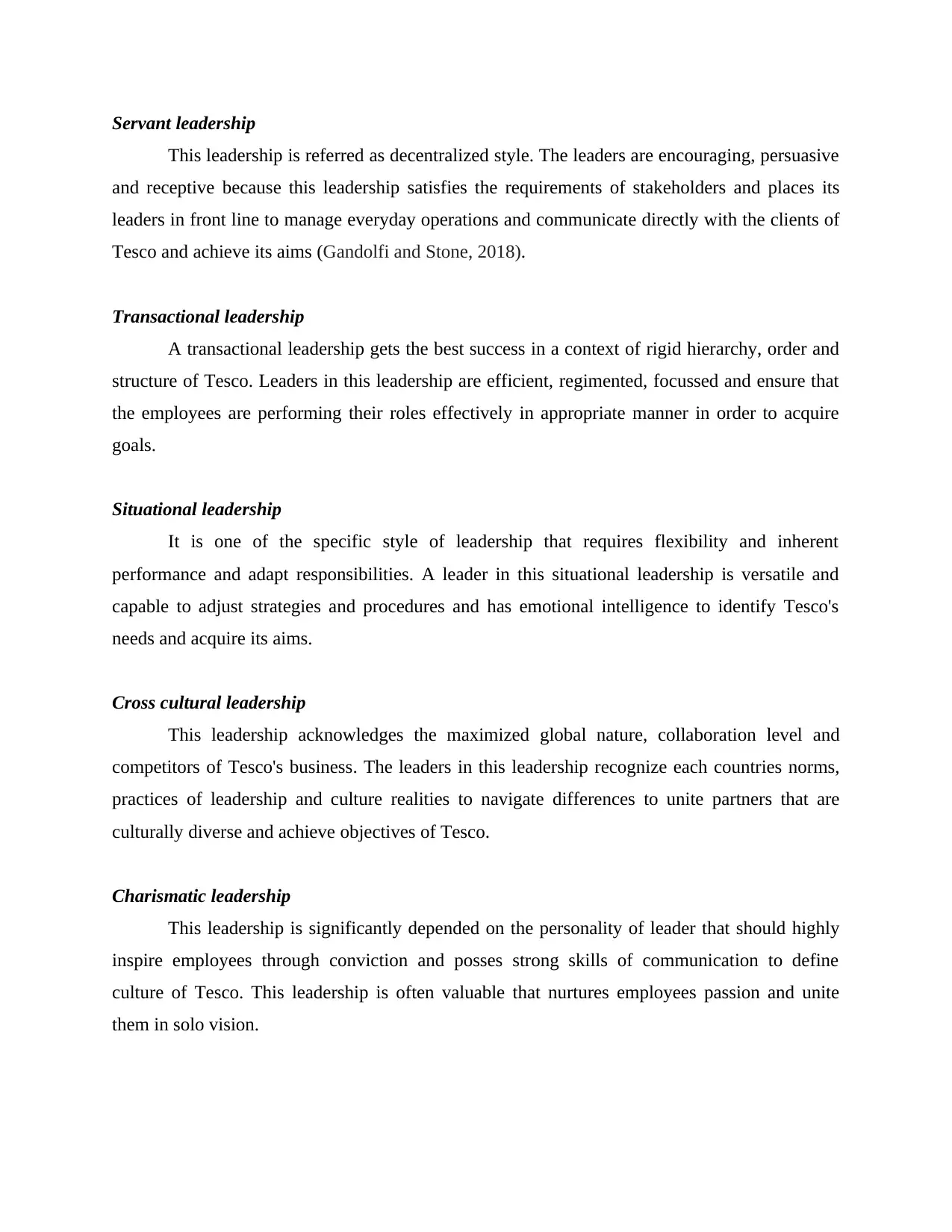
Servant leadership
This leadership is referred as decentralized style. The leaders are encouraging, persuasive
and receptive because this leadership satisfies the requirements of stakeholders and places its
leaders in front line to manage everyday operations and communicate directly with the clients of
Tesco and achieve its aims (Gandolfi and Stone, 2018).
Transactional leadership
A transactional leadership gets the best success in a context of rigid hierarchy, order and
structure of Tesco. Leaders in this leadership are efficient, regimented, focussed and ensure that
the employees are performing their roles effectively in appropriate manner in order to acquire
goals.
Situational leadership
It is one of the specific style of leadership that requires flexibility and inherent
performance and adapt responsibilities. A leader in this situational leadership is versatile and
capable to adjust strategies and procedures and has emotional intelligence to identify Tesco's
needs and acquire its aims.
Cross cultural leadership
This leadership acknowledges the maximized global nature, collaboration level and
competitors of Tesco's business. The leaders in this leadership recognize each countries norms,
practices of leadership and culture realities to navigate differences to unite partners that are
culturally diverse and achieve objectives of Tesco.
Charismatic leadership
This leadership is significantly depended on the personality of leader that should highly
inspire employees through conviction and posses strong skills of communication to define
culture of Tesco. This leadership is often valuable that nurtures employees passion and unite
them in solo vision.
This leadership is referred as decentralized style. The leaders are encouraging, persuasive
and receptive because this leadership satisfies the requirements of stakeholders and places its
leaders in front line to manage everyday operations and communicate directly with the clients of
Tesco and achieve its aims (Gandolfi and Stone, 2018).
Transactional leadership
A transactional leadership gets the best success in a context of rigid hierarchy, order and
structure of Tesco. Leaders in this leadership are efficient, regimented, focussed and ensure that
the employees are performing their roles effectively in appropriate manner in order to acquire
goals.
Situational leadership
It is one of the specific style of leadership that requires flexibility and inherent
performance and adapt responsibilities. A leader in this situational leadership is versatile and
capable to adjust strategies and procedures and has emotional intelligence to identify Tesco's
needs and acquire its aims.
Cross cultural leadership
This leadership acknowledges the maximized global nature, collaboration level and
competitors of Tesco's business. The leaders in this leadership recognize each countries norms,
practices of leadership and culture realities to navigate differences to unite partners that are
culturally diverse and achieve objectives of Tesco.
Charismatic leadership
This leadership is significantly depended on the personality of leader that should highly
inspire employees through conviction and posses strong skills of communication to define
culture of Tesco. This leadership is often valuable that nurtures employees passion and unite
them in solo vision.
Paraphrase This Document
Need a fresh take? Get an instant paraphrase of this document with our AI Paraphraser
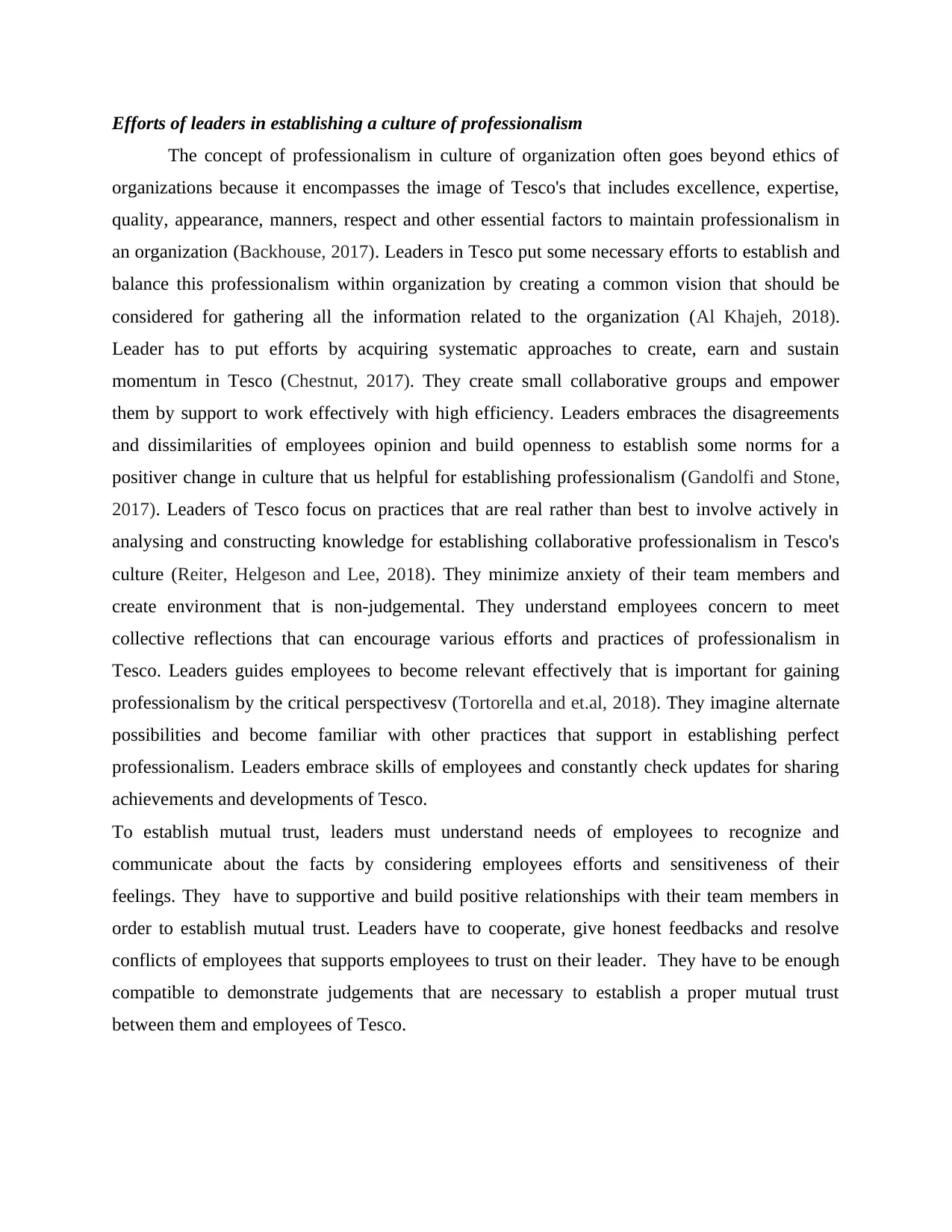
Efforts of leaders in establishing a culture of professionalism
The concept of professionalism in culture of organization often goes beyond ethics of
organizations because it encompasses the image of Tesco's that includes excellence, expertise,
quality, appearance, manners, respect and other essential factors to maintain professionalism in
an organization (Backhouse, 2017). Leaders in Tesco put some necessary efforts to establish and
balance this professionalism within organization by creating a common vision that should be
considered for gathering all the information related to the organization (Al Khajeh, 2018).
Leader has to put efforts by acquiring systematic approaches to create, earn and sustain
momentum in Tesco (Chestnut, 2017). They create small collaborative groups and empower
them by support to work effectively with high efficiency. Leaders embraces the disagreements
and dissimilarities of employees opinion and build openness to establish some norms for a
positiver change in culture that us helpful for establishing professionalism (Gandolfi and Stone,
2017). Leaders of Tesco focus on practices that are real rather than best to involve actively in
analysing and constructing knowledge for establishing collaborative professionalism in Tesco's
culture (Reiter, Helgeson and Lee, 2018). They minimize anxiety of their team members and
create environment that is non-judgemental. They understand employees concern to meet
collective reflections that can encourage various efforts and practices of professionalism in
Tesco. Leaders guides employees to become relevant effectively that is important for gaining
professionalism by the critical perspectivesv (Tortorella and et.al, 2018). They imagine alternate
possibilities and become familiar with other practices that support in establishing perfect
professionalism. Leaders embrace skills of employees and constantly check updates for sharing
achievements and developments of Tesco.
To establish mutual trust, leaders must understand needs of employees to recognize and
communicate about the facts by considering employees efforts and sensitiveness of their
feelings. They have to supportive and build positive relationships with their team members in
order to establish mutual trust. Leaders have to cooperate, give honest feedbacks and resolve
conflicts of employees that supports employees to trust on their leader. They have to be enough
compatible to demonstrate judgements that are necessary to establish a proper mutual trust
between them and employees of Tesco.
The concept of professionalism in culture of organization often goes beyond ethics of
organizations because it encompasses the image of Tesco's that includes excellence, expertise,
quality, appearance, manners, respect and other essential factors to maintain professionalism in
an organization (Backhouse, 2017). Leaders in Tesco put some necessary efforts to establish and
balance this professionalism within organization by creating a common vision that should be
considered for gathering all the information related to the organization (Al Khajeh, 2018).
Leader has to put efforts by acquiring systematic approaches to create, earn and sustain
momentum in Tesco (Chestnut, 2017). They create small collaborative groups and empower
them by support to work effectively with high efficiency. Leaders embraces the disagreements
and dissimilarities of employees opinion and build openness to establish some norms for a
positiver change in culture that us helpful for establishing professionalism (Gandolfi and Stone,
2017). Leaders of Tesco focus on practices that are real rather than best to involve actively in
analysing and constructing knowledge for establishing collaborative professionalism in Tesco's
culture (Reiter, Helgeson and Lee, 2018). They minimize anxiety of their team members and
create environment that is non-judgemental. They understand employees concern to meet
collective reflections that can encourage various efforts and practices of professionalism in
Tesco. Leaders guides employees to become relevant effectively that is important for gaining
professionalism by the critical perspectivesv (Tortorella and et.al, 2018). They imagine alternate
possibilities and become familiar with other practices that support in establishing perfect
professionalism. Leaders embrace skills of employees and constantly check updates for sharing
achievements and developments of Tesco.
To establish mutual trust, leaders must understand needs of employees to recognize and
communicate about the facts by considering employees efforts and sensitiveness of their
feelings. They have to supportive and build positive relationships with their team members in
order to establish mutual trust. Leaders have to cooperate, give honest feedbacks and resolve
conflicts of employees that supports employees to trust on their leader. They have to be enough
compatible to demonstrate judgements that are necessary to establish a proper mutual trust
between them and employees of Tesco.
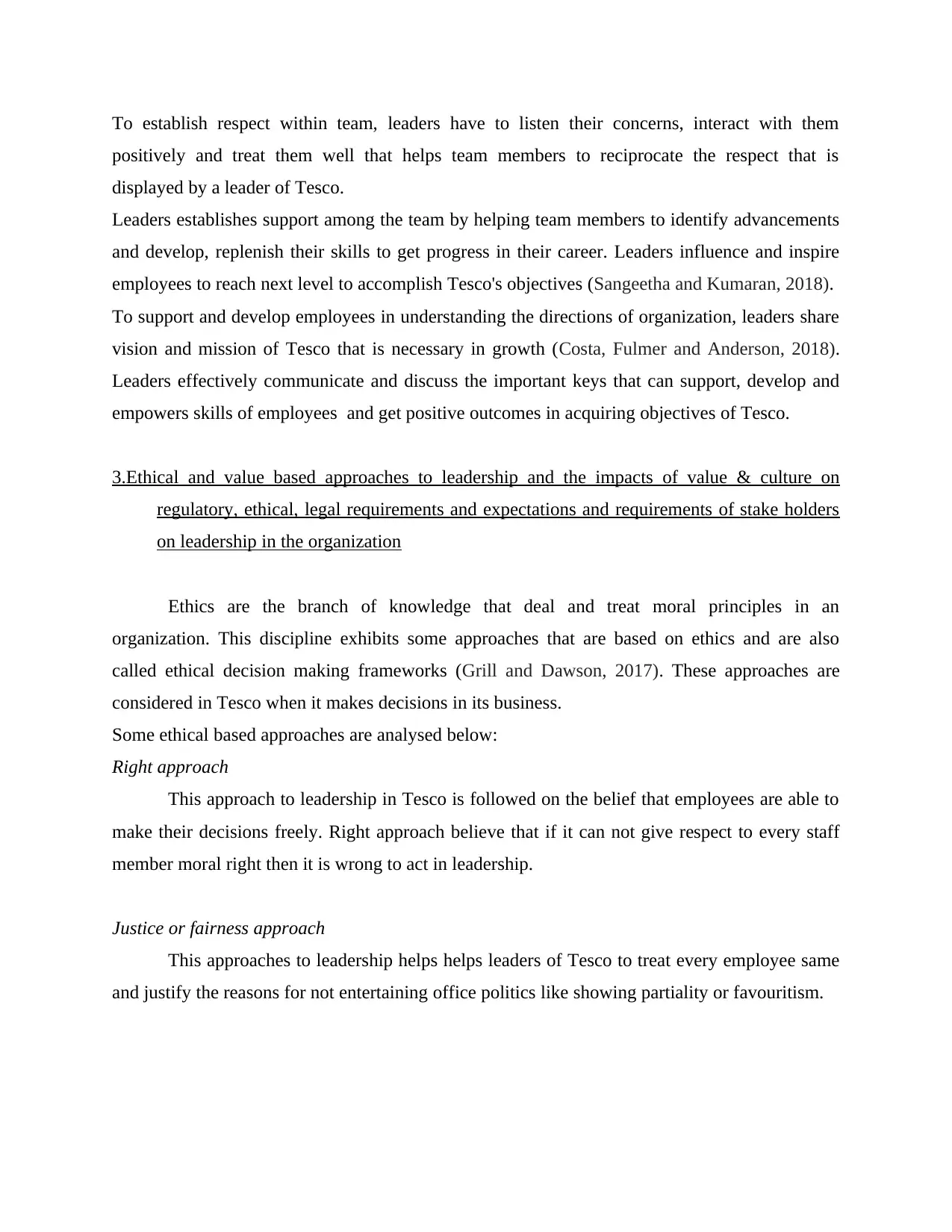
To establish respect within team, leaders have to listen their concerns, interact with them
positively and treat them well that helps team members to reciprocate the respect that is
displayed by a leader of Tesco.
Leaders establishes support among the team by helping team members to identify advancements
and develop, replenish their skills to get progress in their career. Leaders influence and inspire
employees to reach next level to accomplish Tesco's objectives (Sangeetha and Kumaran, 2018).
To support and develop employees in understanding the directions of organization, leaders share
vision and mission of Tesco that is necessary in growth (Costa, Fulmer and Anderson, 2018).
Leaders effectively communicate and discuss the important keys that can support, develop and
empowers skills of employees and get positive outcomes in acquiring objectives of Tesco.
3.Ethical and value based approaches to leadership and the impacts of value & culture on
regulatory, ethical, legal requirements and expectations and requirements of stake holders
on leadership in the organization
Ethics are the branch of knowledge that deal and treat moral principles in an
organization. This discipline exhibits some approaches that are based on ethics and are also
called ethical decision making frameworks (Grill and Dawson, 2017). These approaches are
considered in Tesco when it makes decisions in its business.
Some ethical based approaches are analysed below:
Right approach
This approach to leadership in Tesco is followed on the belief that employees are able to
make their decisions freely. Right approach believe that if it can not give respect to every staff
member moral right then it is wrong to act in leadership.
Justice or fairness approach
This approaches to leadership helps helps leaders of Tesco to treat every employee same
and justify the reasons for not entertaining office politics like showing partiality or favouritism.
positively and treat them well that helps team members to reciprocate the respect that is
displayed by a leader of Tesco.
Leaders establishes support among the team by helping team members to identify advancements
and develop, replenish their skills to get progress in their career. Leaders influence and inspire
employees to reach next level to accomplish Tesco's objectives (Sangeetha and Kumaran, 2018).
To support and develop employees in understanding the directions of organization, leaders share
vision and mission of Tesco that is necessary in growth (Costa, Fulmer and Anderson, 2018).
Leaders effectively communicate and discuss the important keys that can support, develop and
empowers skills of employees and get positive outcomes in acquiring objectives of Tesco.
3.Ethical and value based approaches to leadership and the impacts of value & culture on
regulatory, ethical, legal requirements and expectations and requirements of stake holders
on leadership in the organization
Ethics are the branch of knowledge that deal and treat moral principles in an
organization. This discipline exhibits some approaches that are based on ethics and are also
called ethical decision making frameworks (Grill and Dawson, 2017). These approaches are
considered in Tesco when it makes decisions in its business.
Some ethical based approaches are analysed below:
Right approach
This approach to leadership in Tesco is followed on the belief that employees are able to
make their decisions freely. Right approach believe that if it can not give respect to every staff
member moral right then it is wrong to act in leadership.
Justice or fairness approach
This approaches to leadership helps helps leaders of Tesco to treat every employee same
and justify the reasons for not entertaining office politics like showing partiality or favouritism.
⊘ This is a preview!⊘
Do you want full access?
Subscribe today to unlock all pages.

Trusted by 1+ million students worldwide
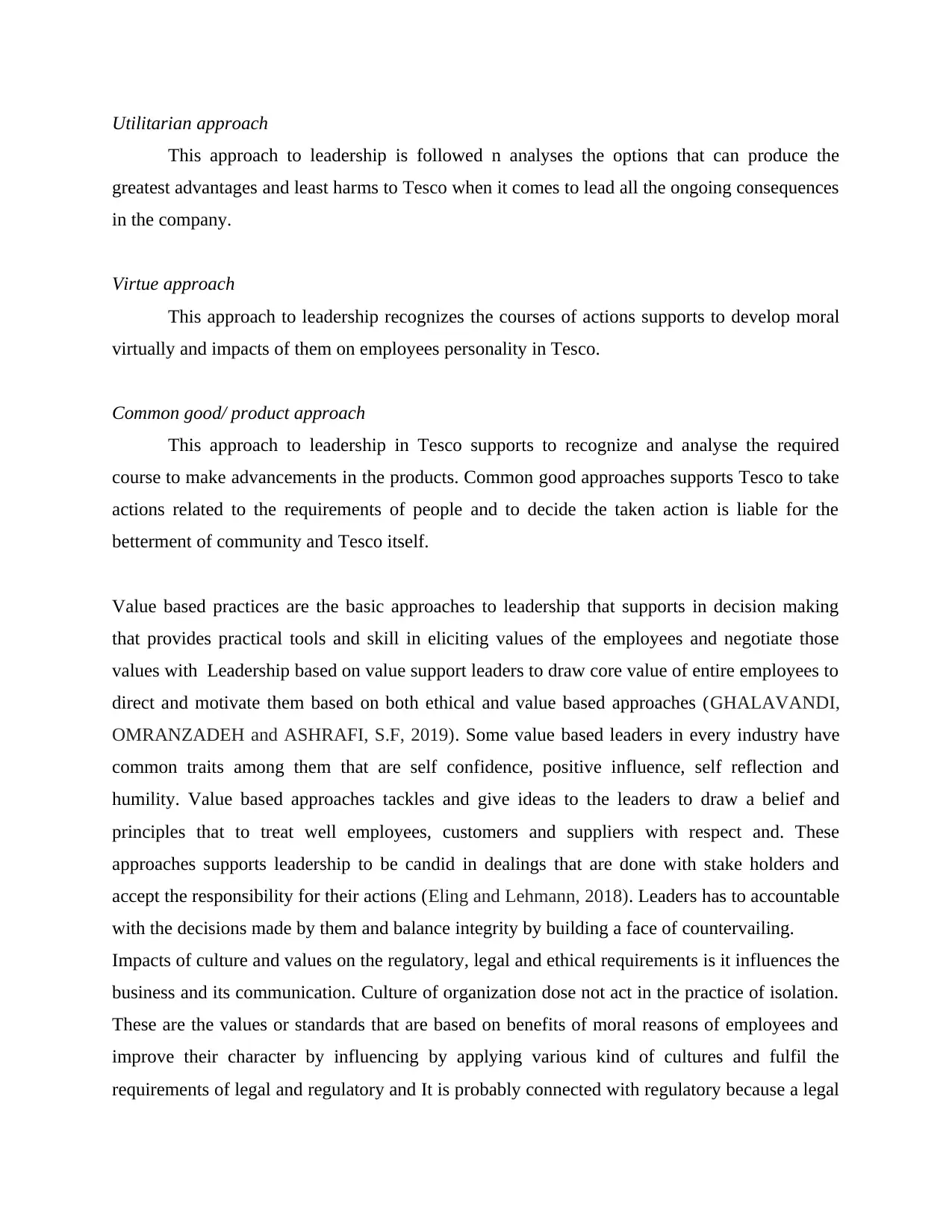
Utilitarian approach
This approach to leadership is followed n analyses the options that can produce the
greatest advantages and least harms to Tesco when it comes to lead all the ongoing consequences
in the company.
Virtue approach
This approach to leadership recognizes the courses of actions supports to develop moral
virtually and impacts of them on employees personality in Tesco.
Common good/ product approach
This approach to leadership in Tesco supports to recognize and analyse the required
course to make advancements in the products. Common good approaches supports Tesco to take
actions related to the requirements of people and to decide the taken action is liable for the
betterment of community and Tesco itself.
Value based practices are the basic approaches to leadership that supports in decision making
that provides practical tools and skill in eliciting values of the employees and negotiate those
values with Leadership based on value support leaders to draw core value of entire employees to
direct and motivate them based on both ethical and value based approaches (GHALAVANDI,
OMRANZADEH and ASHRAFI, S.F, 2019). Some value based leaders in every industry have
common traits among them that are self confidence, positive influence, self reflection and
humility. Value based approaches tackles and give ideas to the leaders to draw a belief and
principles that to treat well employees, customers and suppliers with respect and. These
approaches supports leadership to be candid in dealings that are done with stake holders and
accept the responsibility for their actions (Eling and Lehmann, 2018). Leaders has to accountable
with the decisions made by them and balance integrity by building a face of countervailing.
Impacts of culture and values on the regulatory, legal and ethical requirements is it influences the
business and its communication. Culture of organization dose not act in the practice of isolation.
These are the values or standards that are based on benefits of moral reasons of employees and
improve their character by influencing by applying various kind of cultures and fulfil the
requirements of legal and regulatory and It is probably connected with regulatory because a legal
This approach to leadership is followed n analyses the options that can produce the
greatest advantages and least harms to Tesco when it comes to lead all the ongoing consequences
in the company.
Virtue approach
This approach to leadership recognizes the courses of actions supports to develop moral
virtually and impacts of them on employees personality in Tesco.
Common good/ product approach
This approach to leadership in Tesco supports to recognize and analyse the required
course to make advancements in the products. Common good approaches supports Tesco to take
actions related to the requirements of people and to decide the taken action is liable for the
betterment of community and Tesco itself.
Value based practices are the basic approaches to leadership that supports in decision making
that provides practical tools and skill in eliciting values of the employees and negotiate those
values with Leadership based on value support leaders to draw core value of entire employees to
direct and motivate them based on both ethical and value based approaches (GHALAVANDI,
OMRANZADEH and ASHRAFI, S.F, 2019). Some value based leaders in every industry have
common traits among them that are self confidence, positive influence, self reflection and
humility. Value based approaches tackles and give ideas to the leaders to draw a belief and
principles that to treat well employees, customers and suppliers with respect and. These
approaches supports leadership to be candid in dealings that are done with stake holders and
accept the responsibility for their actions (Eling and Lehmann, 2018). Leaders has to accountable
with the decisions made by them and balance integrity by building a face of countervailing.
Impacts of culture and values on the regulatory, legal and ethical requirements is it influences the
business and its communication. Culture of organization dose not act in the practice of isolation.
These are the values or standards that are based on benefits of moral reasons of employees and
improve their character by influencing by applying various kind of cultures and fulfil the
requirements of legal and regulatory and It is probably connected with regulatory because a legal
Paraphrase This Document
Need a fresh take? Get an instant paraphrase of this document with our AI Paraphraser
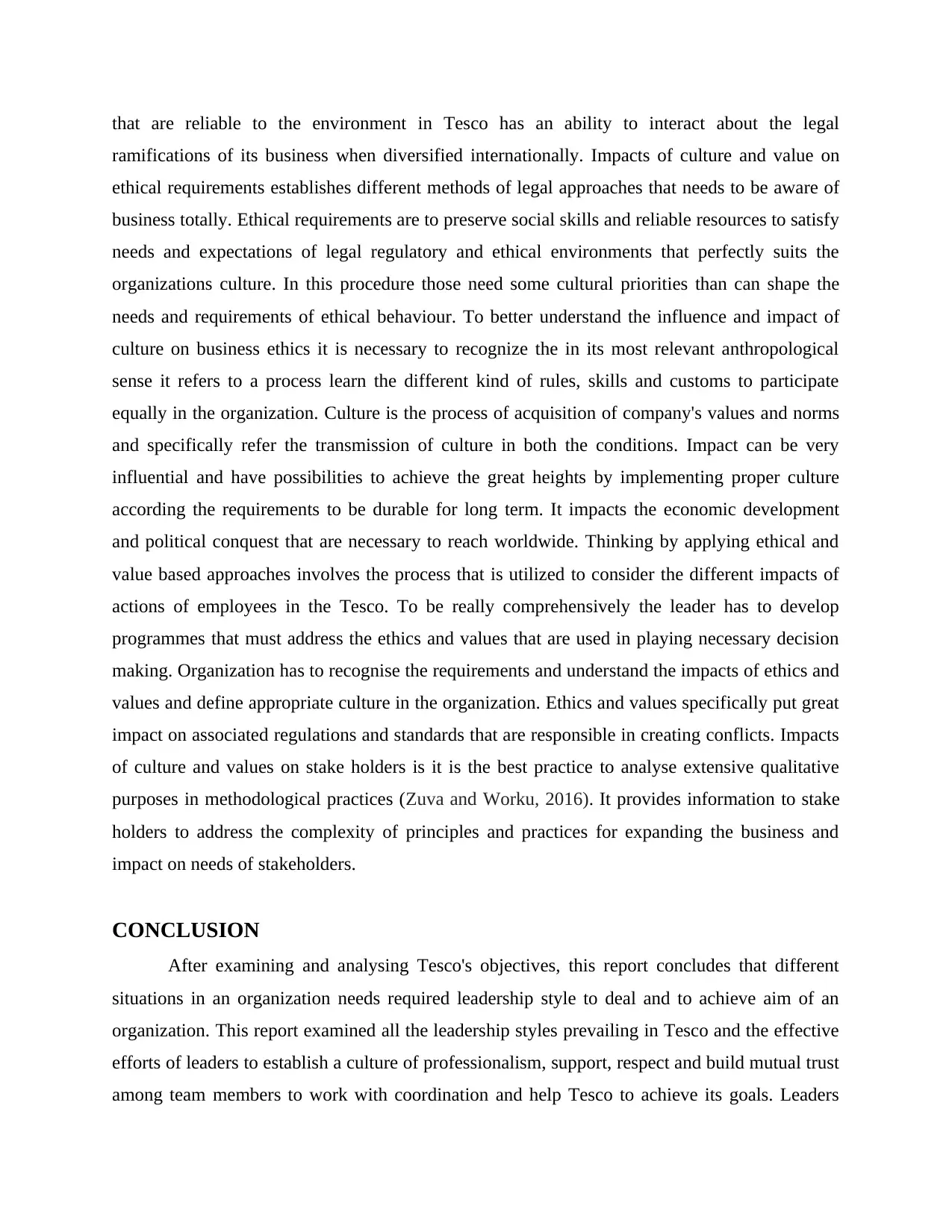
that are reliable to the environment in Tesco has an ability to interact about the legal
ramifications of its business when diversified internationally. Impacts of culture and value on
ethical requirements establishes different methods of legal approaches that needs to be aware of
business totally. Ethical requirements are to preserve social skills and reliable resources to satisfy
needs and expectations of legal regulatory and ethical environments that perfectly suits the
organizations culture. In this procedure those need some cultural priorities than can shape the
needs and requirements of ethical behaviour. To better understand the influence and impact of
culture on business ethics it is necessary to recognize the in its most relevant anthropological
sense it refers to a process learn the different kind of rules, skills and customs to participate
equally in the organization. Culture is the process of acquisition of company's values and norms
and specifically refer the transmission of culture in both the conditions. Impact can be very
influential and have possibilities to achieve the great heights by implementing proper culture
according the requirements to be durable for long term. It impacts the economic development
and political conquest that are necessary to reach worldwide. Thinking by applying ethical and
value based approaches involves the process that is utilized to consider the different impacts of
actions of employees in the Tesco. To be really comprehensively the leader has to develop
programmes that must address the ethics and values that are used in playing necessary decision
making. Organization has to recognise the requirements and understand the impacts of ethics and
values and define appropriate culture in the organization. Ethics and values specifically put great
impact on associated regulations and standards that are responsible in creating conflicts. Impacts
of culture and values on stake holders is it is the best practice to analyse extensive qualitative
purposes in methodological practices (Zuva and Worku, 2016). It provides information to stake
holders to address the complexity of principles and practices for expanding the business and
impact on needs of stakeholders.
CONCLUSION
After examining and analysing Tesco's objectives, this report concludes that different
situations in an organization needs required leadership style to deal and to achieve aim of an
organization. This report examined all the leadership styles prevailing in Tesco and the effective
efforts of leaders to establish a culture of professionalism, support, respect and build mutual trust
among team members to work with coordination and help Tesco to achieve its goals. Leaders
ramifications of its business when diversified internationally. Impacts of culture and value on
ethical requirements establishes different methods of legal approaches that needs to be aware of
business totally. Ethical requirements are to preserve social skills and reliable resources to satisfy
needs and expectations of legal regulatory and ethical environments that perfectly suits the
organizations culture. In this procedure those need some cultural priorities than can shape the
needs and requirements of ethical behaviour. To better understand the influence and impact of
culture on business ethics it is necessary to recognize the in its most relevant anthropological
sense it refers to a process learn the different kind of rules, skills and customs to participate
equally in the organization. Culture is the process of acquisition of company's values and norms
and specifically refer the transmission of culture in both the conditions. Impact can be very
influential and have possibilities to achieve the great heights by implementing proper culture
according the requirements to be durable for long term. It impacts the economic development
and political conquest that are necessary to reach worldwide. Thinking by applying ethical and
value based approaches involves the process that is utilized to consider the different impacts of
actions of employees in the Tesco. To be really comprehensively the leader has to develop
programmes that must address the ethics and values that are used in playing necessary decision
making. Organization has to recognise the requirements and understand the impacts of ethics and
values and define appropriate culture in the organization. Ethics and values specifically put great
impact on associated regulations and standards that are responsible in creating conflicts. Impacts
of culture and values on stake holders is it is the best practice to analyse extensive qualitative
purposes in methodological practices (Zuva and Worku, 2016). It provides information to stake
holders to address the complexity of principles and practices for expanding the business and
impact on needs of stakeholders.
CONCLUSION
After examining and analysing Tesco's objectives, this report concludes that different
situations in an organization needs required leadership style to deal and to achieve aim of an
organization. This report examined all the leadership styles prevailing in Tesco and the effective
efforts of leaders to establish a culture of professionalism, support, respect and build mutual trust
among team members to work with coordination and help Tesco to achieve its goals. Leaders
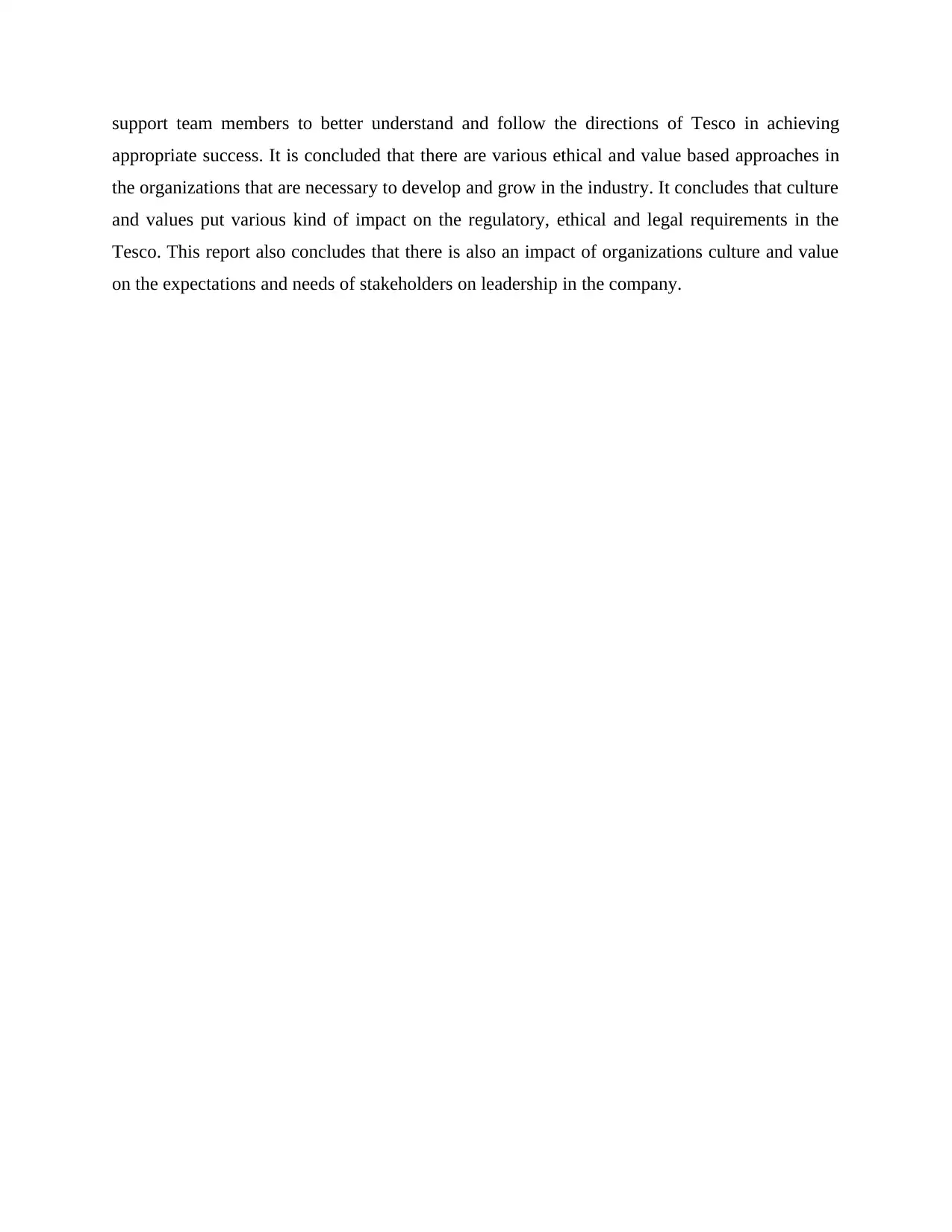
support team members to better understand and follow the directions of Tesco in achieving
appropriate success. It is concluded that there are various ethical and value based approaches in
the organizations that are necessary to develop and grow in the industry. It concludes that culture
and values put various kind of impact on the regulatory, ethical and legal requirements in the
Tesco. This report also concludes that there is also an impact of organizations culture and value
on the expectations and needs of stakeholders on leadership in the company.
appropriate success. It is concluded that there are various ethical and value based approaches in
the organizations that are necessary to develop and grow in the industry. It concludes that culture
and values put various kind of impact on the regulatory, ethical and legal requirements in the
Tesco. This report also concludes that there is also an impact of organizations culture and value
on the expectations and needs of stakeholders on leadership in the company.
⊘ This is a preview!⊘
Do you want full access?
Subscribe today to unlock all pages.

Trusted by 1+ million students worldwide
1 out of 14
Related Documents
Your All-in-One AI-Powered Toolkit for Academic Success.
+13062052269
info@desklib.com
Available 24*7 on WhatsApp / Email
![[object Object]](/_next/static/media/star-bottom.7253800d.svg)
Unlock your academic potential
Copyright © 2020–2026 A2Z Services. All Rights Reserved. Developed and managed by ZUCOL.





